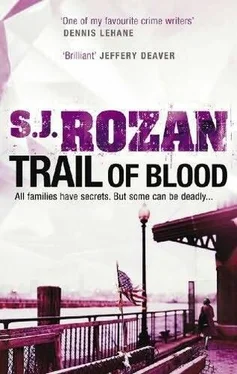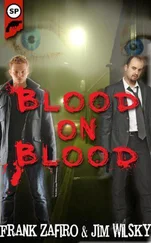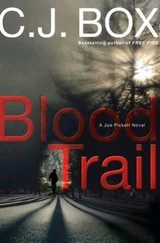S Rozan - Trail of Blood
Здесь есть возможность читать онлайн «S Rozan - Trail of Blood» весь текст электронной книги совершенно бесплатно (целиком полную версию без сокращений). В некоторых случаях можно слушать аудио, скачать через торрент в формате fb2 и присутствует краткое содержание. Жанр: Триллер, на английском языке. Описание произведения, (предисловие) а так же отзывы посетителей доступны на портале библиотеки ЛибКат.
- Название:Trail of Blood
- Автор:
- Жанр:
- Год:неизвестен
- ISBN:нет данных
- Рейтинг книги:5 / 5. Голосов: 1
-
Избранное:Добавить в избранное
- Отзывы:
-
Ваша оценка:
- 100
- 1
- 2
- 3
- 4
- 5
Trail of Blood: краткое содержание, описание и аннотация
Предлагаем к чтению аннотацию, описание, краткое содержание или предисловие (зависит от того, что написал сам автор книги «Trail of Blood»). Если вы не нашли необходимую информацию о книге — напишите в комментариях, мы постараемся отыскать её.
Trail of Blood — читать онлайн бесплатно полную книгу (весь текст) целиком
Ниже представлен текст книги, разбитый по страницам. Система сохранения места последней прочитанной страницы, позволяет с удобством читать онлайн бесплатно книгу «Trail of Blood», без необходимости каждый раз заново искать на чём Вы остановились. Поставьте закладку, и сможете в любой момент перейти на страницу, на которой закончили чтение.
Интервал:
Закладка:
“Why not?”
“They say with violent crime it’s protocol to wait a few days. I understand that, but it’s a problem. Ruth is having a terrible time. She’s clinging to the rituals and laws-well, that’s what they’re for, to give you something to hold on to in bad times. She’s become obsessed with the funeral: a kosher burial, starting the shiva period. It’s the last thing she can do for Joel, and she really needs to do it. But all I get from the medical examiner’s office is ‘as soon as we can.’ I started to harangue them-sweetly-and they let it slip that if the police okay the release, it can be expedited. So I talked to that detective, Mulgrew.”
“Ah. But that was like talking to a stone wall in a bad mood, right?”
“Exactly.” I heard that faint amusement again, and I was glad I’d caused it. “ Lydia, I know you don’t work for the city-”
“But you’re hoping I know someone who does. I’ll call you right back.”
I clicked off and punched my speed dial.
“Hi, Lydia. What’s up?”
“Detective Mary Kee, this is your lucky day. Special offer, improve your karma with one easy phone call.”
“Oh, no.”
“Oh, yes. Double karma points if you act without delay.” I told Mary about my conversation with Leah Pilarsky.
“What are you saying? I’m supposed to deal with that?”
“They’ll release the body on an okay from the NYPD.”
“Not from me. I don’t have the rank and it’s not my case.”
“No, your captain does and it’s Midtown’s.”
“Oh, now-”
“You didn’t want your apartment painted anyhow.”
“You want me to call in my chips for this?”
“To help a grieving widow. Like I say, the karma’s real good.”
Silence; then a sigh. “I can’t believe I’m falling for this. Call me back in ten minutes.”
I picked up the next letter, thinking, See, there’s something to be said for ceaseless bustle.
12 May 1938
Dearest Mama,
We’ve been here three days. At the beginning, sensations flew at me so fast my head spun; but now I believe I’m finding what sailors call “sea legs”-the knack of taking a ship’s motion into account as you move about. The streets and buildings of Shanghai don’t move, Mama, but I promise you they are the only things here that don’t. All is constant, frantic activity, day or night. It requires attention and a steeliness of will to step out one’s own door onto the churning streets. Though in truth it might be more difficult to do so, were the place we’re staying not, on a smaller scale, an exact mirror of Shanghai ’s chaos.
Oh, that sounds so ungrateful! And I’m not, Mama, really. The people who received us are doing the most they can with resources stretched to their limits. We’d be on the streets if not for their kindness. The reception of refugees is managed by a number of committees supported by wealthy Jewish families-British citizens from Bombay -who have seen the need and responded generously. Nevertheless, the need is so great, and so rapidly growing, that this generosity results in conditions which, while providing minimally for us, underline the dismal reality of our situation.
But Mama, reading over what I’ve written, I find I’m failing you as a journalist; my complaining has superseded my obligation to be your eyes and ears. I’ll stop my grumbling instantly, and take up my account from the moment the gangplank connected with the dock.
So, then: We descended in the same orderly chaos in which we’d boarded, though with considerably more trepidation. A small number of passengers were met by relatives or friends who’d come here earlier. (As you and Uncle Horst will be, by us!) Kai-rong had a car waiting, and offered to take Paul and myself to our destination. But we didn’t know our destination! So he left us with careful instructions on how to find him, and went off, his driver employing the car’s horn (with little success) to blast a path through the crowd. I watched until his car was swallowed up; then with Paul I joined the stream of refugees along the wharf. We had been told of a meeting point and were making for it, but before we reached it we were found and warmly greeted by men and women speaking German.
From here, the story becomes less fairy-tale-like, and more befitting the truth of our situation.
We were escorted onto open trucks-trucks, Mama!-and carried through the bumpy streets to our new home. Some people sat on luggage as we inched along, but most crowded the truck’s sides as we had the ship’s rail, to see Shanghai close-up.
Alas, the sight was not encouraging. Narrow lanes, torn pavement, low doorways; windows that were no more than gaping squares, having shutters but no glass; hanging wash; women stirring pots outdoors; children practically naked; men carrying burdens on poles across their shoulders. Debris, and worse, swirled through open gutters. Everywhere, the smells that had greeted us on shipboard, concentrated tenfold; and everywhere, the dense, swampy heat. People who had dressed their best for disembarkation removed coats and loosened starched collars, and it became a contest, whether one’s hat was better used to shade one’s face, or fan it.
As we lurched on we learned our destination: Hongkew! That desolate bombed area we’d floated by on the Conte Biancamano. Which, half a week behind us, now seems like just a dream.
Finally we came to a halt. Gentlemen helped ladies from the trucks, and we faced our new home.
This shelter-there are a number, and they are called “Homes,” a well-meant but mocking title-fills an abandoned warehouse. Walls are bare brick and floors are concrete and all are in bad repair. On the ground floor are kitchens, a dining hall, and a medical clinic. Large rooms upstairs serve as dormitories, partitioned by hanging bedsheets. Beds are double-decked bunks or military cots; mine is in the family section, while Paul has been assigned to the room for bachelors. He’s proud to have been placed with the men and not with me as he would be if considered a child; but Mama, I believe he’s lonely, as I know I am.
The kitchen produces barely adequate and unpalatable meals, which nevertheless we’re grateful for. Sanitary facilities are shared, and there is no hot water. Never can you find a moment’s silence: Some child is always crying or some adult talking or coughing. If couples argue, everyone hears; and if they whisper tenderly to each other-the same.
So you can see why finding a place of our own-which from what I’m told is likely to possess many of the disadvantages of this Home but will have one great advantage, privacy-has suddenly become my heart’s desire.
And I suppose I’ll have to continue this account tomorrow, because once again, as-but not at all like-when Paul and I were children in the nursery and you came to kiss us good night, the lights are about to be put out.
Good night, dear Mama.
Your Rosalie
16 May 1938
Dearest Mama,
I know I have not written for days, but it’s so hard to put into words the bewilderment of our daily lives.
The thick, damp heat is unforgiving. Noise is constant, with many sounds unidentifiable and therefore disconcerting. Hongkew’s narrow lanes are so like each other that getting lost is inevitable and finding your way again all but impossible. Yesterday, searching for a vegetable market, I became so hopelessly confounded in an area all Chinese that I was almost brought to tears, rescued only by a Polish refugee child. She spoke no German, so could not direct me, but took pity and led me to a main avenue. In Shanghai the avenues bear English signs, and so I was able to locate myself. I returned to the Home grateful, though carrotless.
The streets are overwhelming, Mama. The heat and crowding combine to assure that life is lived out of doors, and thus publicly. Beggars abound, both adults and children, a sight I have not gotten used to; but also shoemakers, dentists, druggists, teahouses, and public letter-writers-a lending library, Mama, of Chinese books, attached to shelves by strings just long enough to reach nearby benches! All are on the streets, and one is expected to step around them, as work takes precedence over passing by. Everywhere we hear the competing shouts of vendors, the clack of mah-jongg tiles, and the clangs and mournful strings of Chinese music, as these are also activities for the street.
Читать дальшеИнтервал:
Закладка:
Похожие книги на «Trail of Blood»
Представляем Вашему вниманию похожие книги на «Trail of Blood» списком для выбора. Мы отобрали схожую по названию и смыслу литературу в надежде предоставить читателям больше вариантов отыскать новые, интересные, ещё непрочитанные произведения.
Обсуждение, отзывы о книге «Trail of Blood» и просто собственные мнения читателей. Оставьте ваши комментарии, напишите, что Вы думаете о произведении, его смысле или главных героях. Укажите что конкретно понравилось, а что нет, и почему Вы так считаете.












